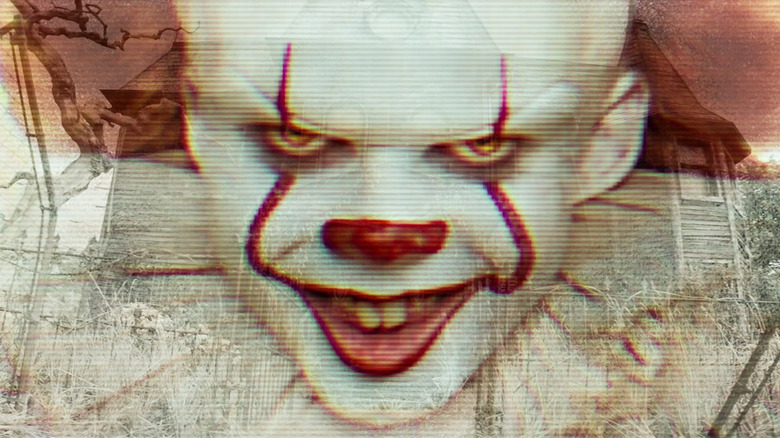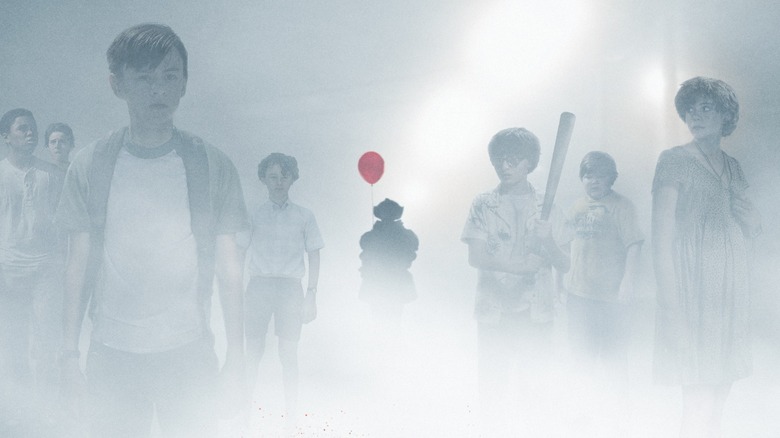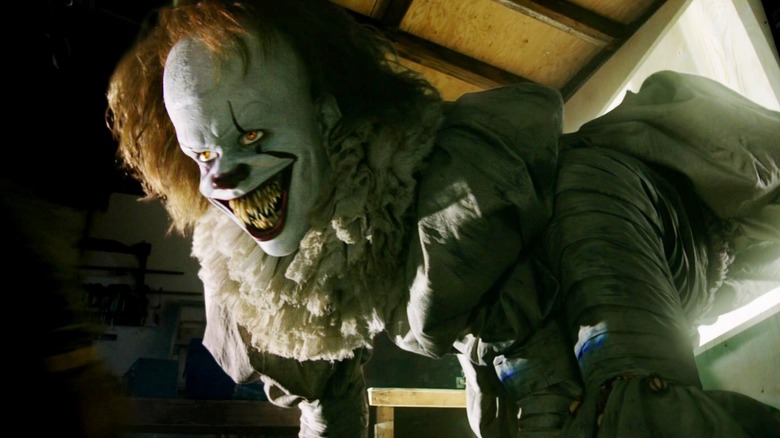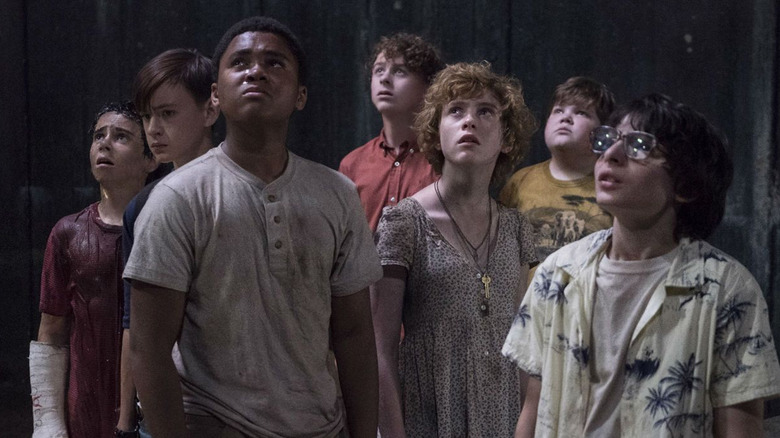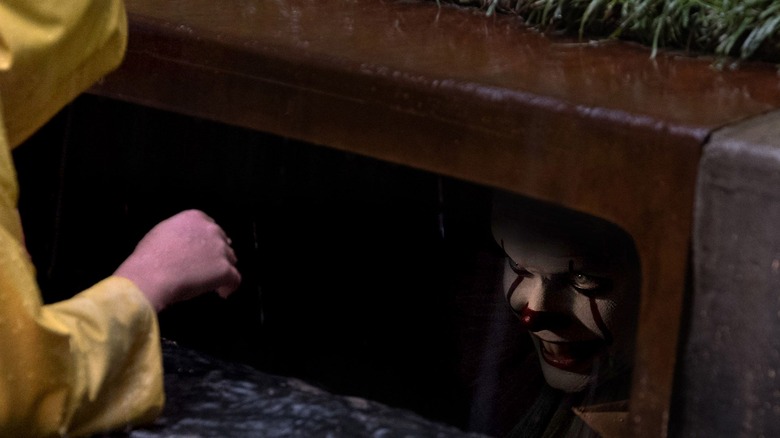Tales From The Box Office: 5 Years Ago, Stephen King's IT Became The Biggest Horror Hit Ever
(Welcome to Tales from the Box Office, our column that examines box office miracles, disasters, and everything in between, as well as what we can learn from them.)
Stephen King's name is synonymous with horror. He is one of the most prolific authors in history and his tales have, as is often the case with best-selling authors, gone on to inspire many adaptations over the years. Some good ("Cujo"), some bad ("The Dark Tower"), and some stone-cold cinematic classics ("The Shawshank Redemption"). But it was in 2017, when one of King's most beloved tales was finally brought to life on the big screen, that the king finally took his crown.
That is the year that saw Warner Bros. release the remake of "It," based on King's novel about the child-eating clown of the same name that had previously inspired a TV miniseries starring Tim Curry as Pennywise. But that version, while it has its defenders, couldn't be expected to hold its weight with modern audiences, and this story always felt like it deserved something a bit more grandiose. That is exactly what director Andy Muschietti did with his adaptation of King's massive novel, dividing the tale in two, and allowing for that first chapter to tell an entirely satisfying tale on its own. That tale proved to be more satisfying than anyone could have imagined, as it literally became the biggest horror movie of all time.
In honor of the movie's fifth anniversary, we're looking back at "It," how the movie(s) came to be, how the opening weekend box office murdered even the most absurdly optimistic expectations, and what lessons can be learned from its success. Let's dig in, shall we?
The movie: It
The two-part miniseries originally aired in 1990, so by 2017 it was ripe for a reboot. Reports of Warner Bros. trying to remake "It" date back to at least 2009 when Dave Kajganich ("The Invasion") had been hired to pen a screenplay. As is so often the case, the project languished in development hell for several years, changing hands a few times. But things really seemed to get cooking when, in 2012, Cary Fukunaga ("True Detective") boarded the adaptation, ringing as an exciting development to those who had been following the project at the time.
But things didn't go as planned. Despite the fact that Fukunaga spent several years developing a two-part adaptation, he left the project in 2015, which paved the way for Andy Muschietti ("Mama") to take over. As for why Fukunaga's version fell apart? Shortly after his departure, he explained that the studio "wanted archetypes and scares." Fukunaga added that, "They wanted me to make a much more inoffensive, conventional script. But I don't think you can do proper Stephen King and make it inoffensive." As for what his version looked like? Fukunaga explained:
"The main difference was making Pennywise more than just the clown. After 30 years of villains that could read the emotional minds of characters and scare them, trying to find really sadistic and intelligent ways he scares children, and also the children had real lives prior to being scared. And all that character work takes time. It's a slow build, but it's worth it, especially by the second film. But definitely even in the first film, it pays off."
The pieces fall into place
Oftentimes, a director change on a movie that has already been in development for years can mean even further delays. But with Muschietti now at the helm, things started to move rapidly. Warner Bros. set a firm 2017 release date that didn't shift, casting decisions were made, and filming actually began in the summer of 2016. One of the biggest casting decisions came with Pennywise. Will Poulter ("We're the Millers") had been in talks for the role during Fukunaga's tenure, but moved on after he departed. Enter Bill Skarsgård.
In what might be the decision that turned this movie into a behemoth hit, Skarsgård was tasked with bringing Pennywise to life and did so in insanely effective fashion. He scared the kids on set. He gave a fully devoted performance that would probably humble a great many Oscar winners. It wasn't about having a big name actor — it was about making a scary clown for the ages. Safe to say, given the results, that's exactly what Muschietti, Skarsgård, and the crew did.
The other key decision was focusing the first "It" entirely on the younger edition of The Losers Club, instead of having the story alternate with the adult timeline like it did in King's novel. Riding that "Stranger Things" wave of '80s nostalgia and that "kids on bikes" subgenre that people seem to love, this iteration of the story seemed to come at the perfect time. A stellar cast of youngsters including Jaeden Martell (Bill), Finn Wolfhard (Richie), Sophia Lillis (Beverly), Jeremy Ray Taylor (Ben), Chosen Jacobs (Mike), Jack Dylan Grazer (Eddie), Wyatt Oleff (Stanley), and Jackson Robert Scott (Georgie) worked to perfectly compliment Skarsgård's terrifying force of evil in what can only be described as perfect chemistry.
With a stellar cast, an audience-friendly story, a director eager to prove himself on a large stage, and the full backing of one of the biggest studios on the planet, horror history was on the verge of being made.
The financial journey
It simply cannot be overstated just how much the general public latched onto this movie ahead of opening weekend. Generational nostalgia, horror doing well heading into the Halloween season, and even some real-life scary clown happenings all helped fuel the fire leading up to the release of "It." Box office expectations kept going up and up, with predictions swelling to $60 million for the film's opening weekend. That would have been a staggering success but, remarkably enough, even those lofty predictions weren't even remotely close. "It" was going to come out swinging and rank as perhaps the most shocking success story in the history of the box office. I don't mean to sound hyperbolic but truly, what this movie did is beyond remarkable.
"It" opened on September 8, 2017, riding a wave of sky-high expectations. Even so, nobody could have imagined what was going to happen. The movie pulled in a stupendous $50 million on Friday alone, nearly matching the already massive opening weekend predictions. Come Monday morning, Muschietti's adaptation of King's beloved tale had grossed $123 million domestically. Warner Bros. had a runaway hit.
The film stayed atop the charts the following weekend and kept the money train floating for weeks on end. All told, "It" earned $327.4 million domestically to go with a $372.9 million international haul for a grand total of $700.3 million. That makes it the highest-grossing horror movie in history — not just among R-rated horror movies, but horror movies of any kind. Most amazing of all? It did all of this on a $35 million budget, meaning it earned 20 times that in ticket sales. If there were ever a benchmark for success in blockbuster filmmaking, this is it.
The lessons contained within
I am no marketing expert. I am merely a guy who loves movies who sees a lot of trailers and a lot of posters for them. It's amazing how many times studios just seem to miss the mark or, at the very least, seem to miss maximizing an opportunity. With "It," I think a ridiculous amount of credit is owed 1) to Muschietti for crafting the most audience-friendly yet faithful version of this story possible and 2) to the Warner Bros. marketing department for crafting an all-timer of a campaign. For me, it all goes back to that original, stellar teaser trailer.
Why can't all movie trailers be that good? Honestly. From the second that trailer hit, you could almost feel the temperature in the room change. Everyone was aware that this movie was coming, and it seemed like everyone wanted to see it. Granted, Warner Bros. had the insane benefit of having a genuinely great movie to market but still, we've seen marketing campaigns fail great movies before. See Tom Cruise's "Edge of Tomorrow," for example. Also a Warner Bros. movie!
The other semi-unpopular thing I have to say here is that Warner Bros. may have been right to walk away from Fukunaga's version. Sure, this movie could have made a fifth as much money and still be considered a resounding success. But I think the studio knew they could have something bigger here with the right take. The numbers don't lie, Muschietti and screenwriter Gary Dauberman had the right take on the script. The only real shame of it is that "It Chapter Two" was almost never going to be able to live up to the lofty expectations placed upon it by its predecessor. But hey, $468 million against a $70 million budget is still ridiculously good and tough to argue against.
